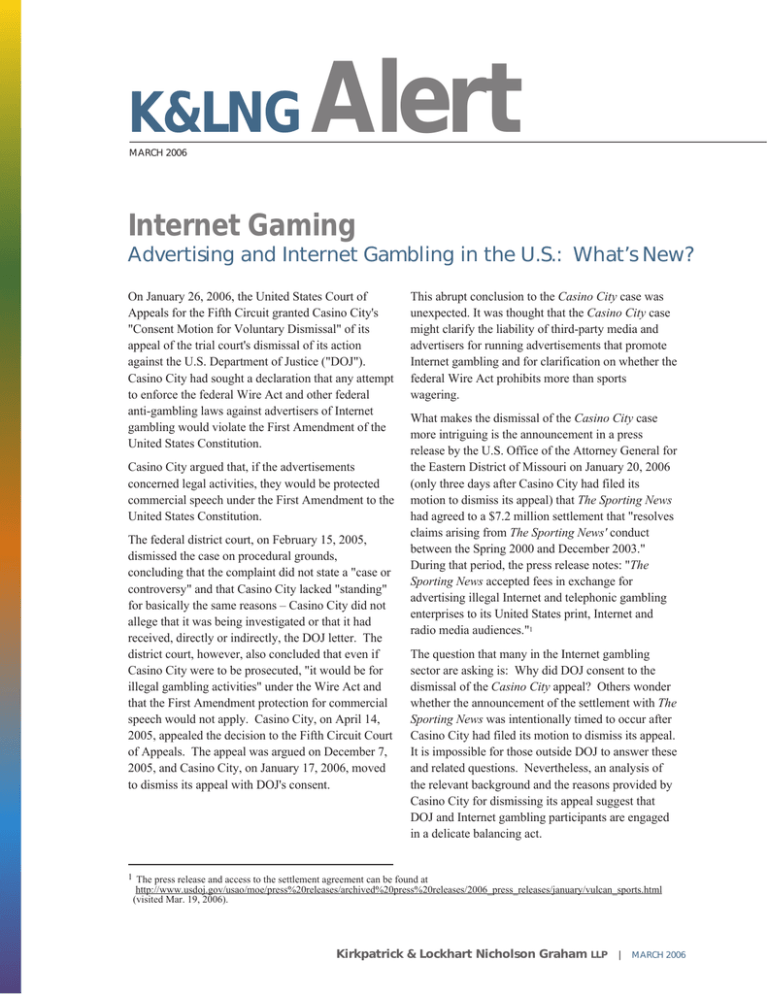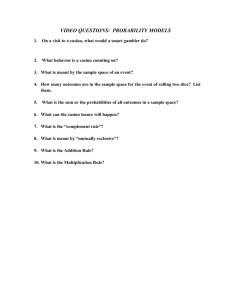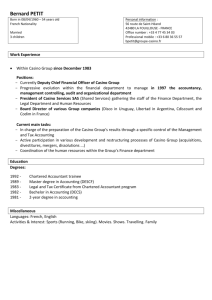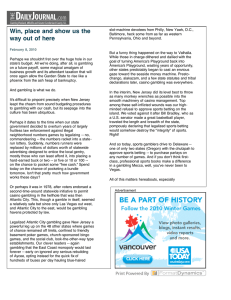
K&LNG
MARCH 2006
Alert
Internet Gaming
Advertising and Internet Gambling in the U.S.: What’s New?
On January 26, 2006, the United States Court of
Appeals for the Fifth Circuit granted Casino City's
"Consent Motion for Voluntary Dismissal" of its
appeal of the trial court's dismissal of its action
against the U.S. Department of Justice ("DOJ").
Casino City had sought a declaration that any attempt
to enforce the federal Wire Act and other federal
anti-gambling laws against advertisers of Internet
gambling would violate the First Amendment of the
United States Constitution.
Casino City argued that, if the advertisements
concerned legal activities, they would be protected
commercial speech under the First Amendment to the
United States Constitution.
The federal district court, on February 15, 2005,
dismissed the case on procedural grounds,
concluding that the complaint did not state a "case or
controversy" and that Casino City lacked "standing"
for basically the same reasons – Casino City did not
allege that it was being investigated or that it had
received, directly or indirectly, the DOJ letter. The
district court, however, also concluded that even if
Casino City were to be prosecuted, "it would be for
illegal gambling activities" under the Wire Act and
that the First Amendment protection for commercial
speech would not apply. Casino City, on April 14,
2005, appealed the decision to the Fifth Circuit Court
of Appeals. The appeal was argued on December 7,
2005, and Casino City, on January 17, 2006, moved
to dismiss its appeal with DOJ's consent.
This abrupt conclusion to the Casino City case was
unexpected. It was thought that the Casino City case
might clarify the liability of third-party media and
advertisers for running advertisements that promote
Internet gambling and for clarification on whether the
federal Wire Act prohibits more than sports
wagering.
What makes the dismissal of the Casino City case
more intriguing is the announcement in a press
release by the U.S. Office of the Attorney General for
the Eastern District of Missouri on January 20, 2006
(only three days after Casino City had filed its
motion to dismiss its appeal) that The Sporting News
had agreed to a $7.2 million settlement that "resolves
claims arising from The Sporting News' conduct
between the Spring 2000 and December 2003."
During that period, the press release notes: "The
Sporting News accepted fees in exchange for
advertising illegal Internet and telephonic gambling
enterprises to its United States print, Internet and
radio media audiences."1
The question that many in the Internet gambling
sector are asking is: Why did DOJ consent to the
dismissal of the Casino City appeal? Others wonder
whether the announcement of the settlement with The
Sporting News was intentionally timed to occur after
Casino City had filed its motion to dismiss its appeal.
It is impossible for those outside DOJ to answer these
and related questions. Nevertheless, an analysis of
the relevant background and the reasons provided by
Casino City for dismissing its appeal suggest that
DOJ and Internet gambling participants are engaged
in a delicate balancing act.
1 The press release and access to the settlement agreement can be found at
http://www.usdoj.gov/usao/moe/press%20releases/archived%20press%20releases/2006_press_releases/january/vulcan_sports.html
(visited Mar. 19, 2006).
Kirkpatrick & Lockhart Nicholson Graham LLP |
MARCH 2006
THE TRIGGER IS PULLED
In June 2003, DOJ sent a letter to numerous media
outlets and representatives. The letter informed them
that online gambling, including non-sports wagering,
is illegal in the U.S. under the federal Wire Act. The
letter went on to advise that, therefore, any
advertising of online gambling could result in
prosecution for aiding and abetting criminal conduct.
The letter triggered action by the U.S. Attorney for
the Eastern District of Missouri, who began to
investigate the extent to which various media
companies might be engaged in allegedly illegal
activity. Beginning in September 2003, federal grand
jury subpoenas were sent to media outlets that had
accepted Internet gambling ads.2 This investigation
prompted many online advertisers to remove
gambling advertisements from their websites. For
example, in April 2004, it was reported that Yahoo
and Google stopped taking advertisements in the U.S.
from gambling companies and related companies.3
Other media outlets apparently did not stop quickly
enough. It has been reported that in 2003-2004, The
Discovery Channel had millions seized by the federal
government as illegal profits from the advertisement
of Internet gambling, including money paid to run
Paradise Poker and PartyPoker.com advertisements.4
CASINO CITY'S RETORT
In response to DOJ's letter and the initial reactions of
many media outlets, Casino City, an online gambling
portal that advertises online gambling sites, in August
2004, filed a lawsuit against the United States in the
U.S. District Court for the Middle District of
Louisiana. Casino City asked the district court to
declare that an attempt to enforce the Wire Act and
other federal statutes against Casino City and others
similarly situated for the advertisement of online
gambling would constitute a violation of the Free
Speech Clause of the First Amendment to the U.S.
Constitution. According to Casino City, the
gambling it advertised was legal, so the
advertisements would be protected commercial
speech under the First Amendment. Casino City's
argument subsumed the issue of what constituted
illegal gambling under the federal Wire Act.
The district court, on February 15, 2005, dismissed
the case on procedural grounds, concluding that the
complaint did not state a "case or controversy" and
that Casino City lacked "standing." Casino City had
not alleged that it was being investigated or that it
had even received the DOJ letter, either directly or
from an entity in which it was affiliated. The district
court did not stop its analysis with the procedural
issues. Instead, the district court went on to conclude
that even if Casino City were to be prosecuted,
"it would be for illegal gambling activities" under the
Wire Act and that the First Amendment protection
for commercial speech would not apply.5 Casino
City appealed the district court’s ruling to the United
States Court of Appeals for the Fifth Circuit, and the
appeal was argued on December 7, 2005.
The importance of the Casino City case and its
dismissal is debatable. The Fifth Circuit had already
decided that the federal Wire Act does not apply to
non-sports gambling. See In re MasterCard Intern.,
Inc., 313 F.3d 257 (2002). In addition, although DOJ
has been vocal regarding its position on the potential
for prosecution, there has been little follow-through,
at least as far as actual criminal prosecutions are
concerned. After receiving the 2003 letter from the
DOJ, many entities willingly stopped accepting
advertisements for online gambling. Press releases
and news reports in the 2003-2004 period trumpeted
settlements with or seizures of funds from those
advertising Internet gambling.
WHAT ABOUT THE SPORTING NEWS SETTLEMENT?
Nearly contemporaneously with the dismissal of the
Casino City appeal was the announcement by the
current U.S. Attorney for the Eastern District of
Missouri of a $7.2 million settlement with The
Sporting News.6 The settlement agreement calls for
2 See U.S. Court Subpoenas Gambling Portals, INTERACTIVE GAMING NEWS (Sept. 30, 2003).
http://www.igamingnews.com/index.cfm?page=artlisting&tid=4553 (visited Mar. 19, 2006); see also
http://www.covers.com/articles/articles.aspx?TID=43&theArt=18677 (visited Mar. 19, 2006).
3 See Yahoo and Google Ban Gambling Ads, MACNEWSWORLD (April 5, 2004). http://www.macnewsworld.com/story/33319.html
(visited Mar. 19, 2006).
4 See Matt Richtel, "U.S. Steps Up Push Against Online Casinos By Seizing Cash," N.Y. Times (May 31, 2004) reprinted at
http://www.osga.com/artman/publish/article_1578.shtml (visited Mar. 19, 2006); see also http://www.gambling-law-us.com/ArticlesNotes/advertising-online-casinos.htm (visited Mar. 19, 2006).
5 See Casino City Inc., v. United States Department of Justice, M.D. La. No. 04-557-B-M3. The decision is available on the Casino
City website at http://online.casinocity.com/firstamendment/legaldocuments.cfm (visited Mar. 19, 2006).
6 As noted in footnote 1, the settlement agreement can be accessed through
http://www.usdoj.gov/usao/moe/press%20releases/archived%20press%20releases/2006_press_releases/january/vulcan_sports.html
(visited Mar. 19, 2006).
2
Kirkpatrick & Lockhart Nicholson Graham
LLP
| MARCH 2006
The Sporting News to turn over to a "Special Agent"
of the FBI a cashier's check for $4.2 million and
agree not to "contest the forfeiture of those funds to
the United States." The "forfeitable funds" are
described as "resulting from the conduct of
[The Sporting News] involving [its] processing of
payments from or attributable to promoting,
inducing, procuring, aiding and abetting offshore
gambling enterprises conducting, in whole or in part,
on-line and other sports bookmaking and casino-type
gambling activities in the United States in violation
of federal law." The settlement agreement also calls
for The Sporting News to provide a $3 million public
service advertising campaign. This three-year
campaign is "to inform and educate said audience
that offshore/foreign gambling enterprises
conducting, in whole or in part, online or telephonic
sports bookmaking and casino-type gambling
activities in the United States violate federal and state
laws, as do United States-based gamblers using those
wagering services." In the statement announcing the
settlement, the U.S. Attorney reiterated DOJ's
position that "[t]he operation of a commercial
gambling business where bets or wagers are
transmitted in interstate or foreign commerce is
illegal under federal law, and that includes Internet
communications."
WHAT'S GOING ON?
The coincidence of The Sporting News settlement
and filing of Casino City's uncontested voluntary
dismissal of its appeal, ending the Casino City case,
raises questions. DOJ's filings in Casino City
highlighted that the government had not threatened or
taken any action directly against Casino City. It had
not even been the recipient of a subpoena concerning
its advertising activity. The district court found this
to be a fatal defect of the lawsuit – how could there
be any controversy? Of course, this ignored all the
threats, subpoenas, seizures and settlements that had
occurred as a result of the activities in the East
District of Missouri. Why did it take so long for The
Sporting News settlement to be reached? Was the
federal government lying low until Casino City was
over? Why were other blatant advertisements for
Internet gambling permitted to remain in place (such
as the billboard located in Times Square, NYC, with
a banner reading: "Everybody Bets on the Super
Bowl at Sportsbook.com” )? Why have so few U.S.
Attorneys taken enforcement action? In New Jersey,
state officials in 2003 took aggressive action against
Internet gambling and the prominent advertising of
Internet gambling in Atlantic City. But for the most
part, state and federal authorities have done little to
stop the advertising of Internet gambling, including
the advertising of Internet sports wagering, the
illegality of which under the federal Wire Act is not
in dispute.
CONCLUSION
While U.S. courts and federal enforcement
authorities continue to send mixed messages on the
legality of Internet gambling and the scope of the
Wire Act, U.S. gamblers continue to pursue offshore
betting activities available online. Our economy is
global, and Internet gambling is a global industry.
Many consider U.S. attempts to prohibit rather than
regulate Internet gambling to be ill-advised.
Nevertheless, the U.S. Congress continues to address
proposals that would attempt to curtail Inetnet
gambling by U.S. citizens. The conflict between the
real attraction of Internet gambling and those who
seek to outlaw it will continue to evolve. In the
meantime, companies in the Internet gambling sector
and media companies that advertise Internet
gambling need to continue to monitor the U.S. legal
landscape for further developments and clarification.
In contrast to the U.S. position, the U.K. has grasped
the mettle and from 2007 (when the new U.K.
consolidating legislation the Gambling Act 2005
comes fully into operation), it will have modern
gambling laws reflecting the Internet age.
Linda J. Shorey
lshorey@klng.com
717.231.4510
Ashley J. Camron
acamron@klng.com
310.552.5092
Dennis M. P. Ehling
dehling@klng.com
310.552.5090
Warren L. Phelops
wphelops@klng.com
44.(0).20.7648.8129
7 Philip Recchia, "Brit Bookie 'Bowl'ing for N.Y. $$," New York Post (Jan. 29, 2006) (online edition).
3
Kirkpatrick & Lockhart Nicholson Graham
LLP
|
MARCH 2006
If you have questions or would like more information about K&LNG’s Betting and Gaming Practice, please
contact one of our lawyers listed below:
HARRISBURG
David R. Overstreet
Linda J. Shorey
717.231.4517
717.231.4510
doverstreet@klng.com
lshorey@klng.com
617.261.3126
dpeckham@klng.com
BOSTON
Deborah J. Peckham
LONDON
Warren L. Phelops +44.20.7360.8129
wphelops@klng.com
LOS ANGELES
Dennis M.P. Ehling
310.552.5090
dehling@klng.com
www.klng.com
BOSTON • DALLAS • HARRISBURG • LONDON • LOS ANGELES • MIAMI • NEWARK • NEW YORK • PALO ALTO • PITTSBURGH • SAN FRANCISCO • WASHINGTON
Kirkpatrick & Lockhart Nicholson Graham (K&LNG) has approximately 1,000 lawyers and represents entrepreneurs, growth and middle market companies, capital
markets participants, and leading FORTUNE 100 and FTSE 100 global corporations nationally and internationally.
K&LNG is a combination of two limited liability partnerships, each named Kirkpatrick & Lockhart Nicholson Graham LLP, one qualified in Delaware, U.S.A. and
practicing from offices in Boston, Dallas, Harrisburg, Los Angeles, Miami, Newark, New York, Palo Alto, Pittsburgh, San Francisco and Washington and one
incorporated in England practicing from the London office.
This publication/newsletter is for informational purposes and does not contain or convey legal advice. The information herein should not be used or relied upon in
regard to any particular facts or circumstances without first consulting a lawyer.
Data Protection Act 1988—We may contact you from time to time with information on Kirkpatrick & Lockhart Nicholson Graham LLP seminars and with our regular
newsletters, which may be of interest to you. We will not provide your details to any third parties. Please e-mail cgregory@klng.com if you would prefer not to
receive this information.
© 2006 KIRKPATRICK & LOCKHART NICHOLSON GRAHAM LLP. ALL RIGHTS RESERVED.
Kirkpatrick & Lockhart Nicholson Graham
LLP
|
MARCH 2006





